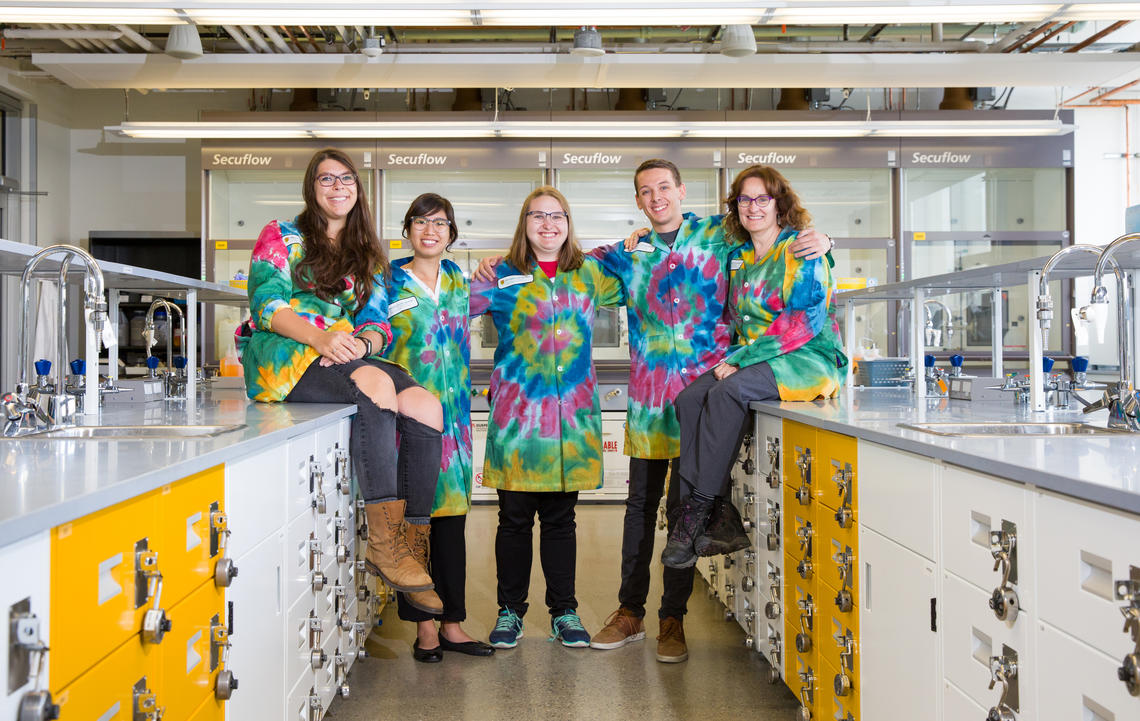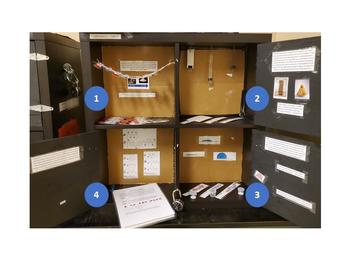May 20, 2021
New consulting company with Faculty of Science roots encourages learning through hands-on activities and games

If you and a team could play a game, solve a puzzle, and accomplish a goal together, would you remember what you learned better than you would if you’d written notes during a lecture or studied from a textbook?
‘Gamification’ of learning is becoming increasingly popular in elementary and high school environments — but what about universities? Does the joy of learning need to stop at adulthood? ChemEscape Consulting Inc. believes students of all levels can benefit from activities that build creativity and enjoyment into a learning experience.
The ChemEscape team got its start as a project to build a locked escape room for Beakerhead in 2018. Escape rooms are physical adventure games where players solve a series of puzzles and riddles. Using clues and hints, participants focus on completing a series of tasks within a set time. Escape rooms become educational when the clues, hints, and tasks to be completed align with course learning objectives.
ChemEscape has continued to innovate since then, bringing the experience to board game format as well as an interactive online platform launching in time for the summer 2021 term.

Marissa Clapson and Brian Gilbert at ChemEscape's debut at Beakerhead in 2018.
Supplied
Shared love of escape rooms sparks startup
Marissa Clapson, a PhD student in the Department of Chemistry and founder and CEO of ChemEscape, says the idea arose naturally from conversations with graduate students Shauna Schechtel and Brian Gilbert as well as Dr. Vivian Janet Mozol, PhD, senior instructor in the Department of Chemistry.
“We all really liked the idea of alternative learning concepts, and making the classroom more fun,” Clapson recalls. “Something we all enjoyed together were escape rooms. Some of us discussed the idea of making questions more puzzle-like, and soon we were making full-blown chemistry escape room puzzles. Ever since then, we’ve just been coming up with more ideas.”
ChemEscape develops puzzles for Grades 4 through 12; however, the main focus has been to create learning puzzles for undergraduate chemistry courses at UCalgary.
On the tails of ChemEscape’s massive success at Beakerhead, the team felt confident taking their ideas into university classrooms.
“From the feedback we got from putting about 10,000 people through our Battle Boxes for the first time, we were able to confidently take them into a classroom, making small iterations and changes based on where the general public struggled with these puzzles,” says Clapson. After several successful years in various chemistry courses, ChemEscape Consulting Inc. was born. Since then, ChemEscape has begun expanding to gamify learning in a wide variety of science backgrounds, including biology, neuroscience, and political science, to name a few, working with professional consultants in these fields.
“We came up with the idea to branch out with our content. We’re not only making ChemEscape puzzles but we also have a wealth of knowledge on how to understand the science of teaching and learning, how to help professors align their course curriculums with specific learning objectives, how to help incorporate more active learning techniques, and how to design learning assessments surrounding these techniques.”

The ChemEscape team in 2018.
Riley Brandt, University of Calgary
Active learning helps with knowledge retention, engagement, study finds
The team published four academic articles in 2020, which expanded upon their experience and research into active learning techniques in chemistry.
“We found students were more likely to think critically and reflect on the learning when they got the chance to actually build and create the puzzles for their classmates to solve,” Schechtel explains.
Schechtel is now involved as a lead consultant alongside Clapson on the development of ChemEscape’s upcoming interactive online platform, a point-and-click adventure-style game.
“The online puzzles allow students to make mistakes and learn. There’s deeper pedagogy within these online puzzles because there are so many different pathways to correct a mistake, then come back and learn it another way,” she says. “Allowing students to navigate their learning is something I really like about these online puzzles. They get a mini assessment while having fun going through the puzzles.”
Gilbert, a graduate student in the Werklund School of Education whose research focuses on science identity, says the online game allows students to work through a story, which is the synthesis of different familiar pharmaceuticals.
“Our in-person escape rooms had a lot of hands-on activities,” he says. “We started building those out into a storyline, where all the puzzles come together to form a bigger story. They’re more holistically built designs where everything is built together, which allows participants to scaffold their learning. It’s more about working through that story and getting that experience rather than each puzzle being designed as its own little package.”
The online product is expected to launch in mid-June for use in the spring Chem 201 course. Those interested will be able to access the online experience in time for September school start.
ChemEscape meets biweekly as a consulting group, where they set goals, discuss possibilities, and create new puzzles. “We are always leaving these meetings with something new to work on!” says Clapson.
“We each bring our own unique ideas,” says Schechtel. “In bringing in the ideas, we build off each other. We’re a collective mind.”
“One of the things that’s amazing about this team is they demonstrate probably the best of what a UCalgary grad can be,” says Mozol. “All of them are very careful thinkers, and work on an informed basis. They look at ideas, engage with things that they’ve seen, look for strengths and weaknesses, build up strengths, and think innovatively about how to take things in a different direction. This whole idea of a company expanding provides opportunities for current graduates and past grads in different disciplines to expand the idea of scientific literacy and educational development. This is the direction that I hope people at UCalgary start to think.”
More information about ChemEscape can be found on their Instagram (@ChemEscape) and Twitter (@chem_escape), or by emailing chemescape@gmail.com.
Brennan Black, University of Calgary
Canadian Innovation Week at UCalgary
As part of UCalgary’s partnership with the Rideau Hall Foundation, we are celebrating Canadian Innovation Week. Join UCalgary experts and researchers May 17-21, for a week of conversation, inspiration and ideas. Learn more.










